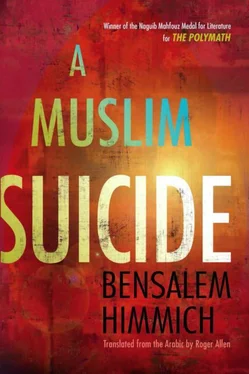"Abu al-Hasan," I told him once we were left alone, "in my dreams I keep seeing Baybars issuing threats against me.
"`I'm told,' he keeps saying, `that you've blasphemed, if I've understood things correctly, by claiming that the Prophet Muhammad, Ibn Amina, exaggerated widely when he said, "I am the seal of the Prophets." What is your response to this charge?'
"I have then replied, `That is not an idea I've ever expressed. I might have misquoted someone else, or else while I was daydreaming or asleep. In any case, there's no harm in denying its validity once I acknowledge it when I'm fully conscious!'
"`You're wrong,' he goes on. `The whole thing has now spread far and wide.'
"As I've already told you,' I reply, `I've explained the context and amended the text. Now that the circumstances have been explained, there's no cause for surprise.'
"And who can vouch for the fact that you've only proclaimed such things in dreams?'
"`God and His apostles,' I've replied. `If I dreamed that I wanted to kill you, would you punish me simply because of the dream?'
"`Is that what you really want?' he asked.
"'Life, 0 Sultan, consists only of dreams. Only God knows how to interpret them.'
"`Take him away and slit his throat so we can be rid of him."'
Abu al-Hasan gave me a sympathetic look. "Holy man of God," he said, may I be your ransom! Don't bother about predictions you see in your dreams. You need to concentrate on the danger signs of your wakeful existence! If the Mamluk sultan comes to Mecca demanding your head on a plate, don't seek refuge with the sharif, with Abu Numa, or even in the cave on the Mountain of the Bull, which is already renowned for hiding the Prophet of God. Go to my hut and spread word that you've gone back to the Maghrib. That's a subterfuge of the kind the Prophet himself used, and it's one you'll need to use till the danger period is over. These Maghribi peasants will be your protection; they would not betray you for any amount of money. Now, Ibn Dara, get up and let's go and pray at Abraham's own house."
As usual, this beloved colleague managed to restore my confidence. I stood up and embraced him. "You're absolutely right," I whispered in his ear.
At the conclusion of the third year of Al-Shushtari's residence in Mecca, he started to look much better.
"Abu al-Hasan," I used to say to him, "it's all a sign of good things to come!" whereas he would reply, "Or maybe one last burst of spirit!"
He made up his mind to travel to Medina for a month, although he categorically forbade me to go with him, knowing full well that the governor of that city was an enemy of mine. At the end of Dhu al-Qa`da, he returned to Mecca. His health had greatly improved; by now he had recovered a good deal of his enthusiasm and energy. He urged me to join him in performing the pilgrimage ceremonies for that year, and I welcomed the invitation. We performed the rituals in the company of the large group of my students and his followers. But no sooner were the ceremonies over and the festival celebrated with the arrival of the month of Muharram than my companion told me with a certain degree of alarm that he had to return to Bijaya. He had had a dream in which his poor wife was begging him to return to the Maghrib as soon as possible.
How could I possibly do anything but agree with his decision to return to his homeland and family that was longing to see him? If circumstances allowed me to do the same, would I hesitate for a single second? At this point I recited his wonderful lines, while he accompanied me:

The difficult parting took place in the middle of the month of Safar. My only consolation was that Abu al-Hasan promised to return whenever he could, bringing with him news of my family and loved ones. He then urged his students to keep me company and follow my example. When the time came for the Jedda caravan to depart, I embraced him, my eyes brimming with tears.
"My master, haven of all that is good," he whispered in my ear, "no bond can be stronger than ours!"
Everyone now crowded round to say farewell to the shaykh, their voices uttering fervent prayers and their hearts bursting with fierce emotions. Behind me, a whole group, the majority of them from the Maghrib, recited some of Abu al-Hasan's wonderful verses:

The fact that Al-Shushtari had now departed from Mecca did not escape Abu Numa's notice. It was just a few days later, right after sunset on a steaming hot Friday afternoon, that he sent for me. He received me in a small lounge that was extremely sparsely furnished. I got the impression that he wanted to check on my health and activities; no one else was included. All that separated us was a small table, with some dried fruit and yoghourt on it.
"When two holy men of God get together," he began by saying, his face wreathed in smiles, "both governor and sultan get ignored! Al-Shushtari has managed to preoccupy your time and energy. There's nothing I can do when you're devoting yourself to the things and people you really love. If it weren't for the fact that I've been incredibly busy myself, administering the lives of the Prophet's family, arranging housing and water facilities during the pilgrimage season, not to mention forays against thieves and highway robbers, I would have demanded my own time and share of enlightenment from you!"
I tried to appear duly humble as I made a point of showing the governor how embarrassed I felt by his words of praise.
"Your campaign, my Lord, against those who would defile this sacred territory," I said by way of focusing on one of his major points, "pillagers and thieves that they are, is indeed a campaign in the cause of God Almighty. Pilgrimage caravans from a wide variety of lands have to cross dangerous terrain in order to reach the Hijaz. That terrain is full of pitfalls and dangers, and sometimes there are all kinds of taxes and major expenses involved too. The situation is so bad now that in the past several major scholars from Andalus have issued legal opinions annulling the obligation to go on the pilgrimage at all. Among intellectual leaders who never went on the hajj to Mecca are the philosopher judge Abu al-Walid Ibn Rushd and his colleague Ibn Tufayl, and the astronomer Al-Bitruji.* There are many other names as well. Ibn Jubayr* did complete the pilgrimage, he being a well-known traveler from the same region and period, and he suffered very badly in the process. In his book Travels he makes a point of registering his own annoyance. The passage, if I recollect it correctly, says, `If there is a land that needs to be purified by the sword and washed clean of its filth and dirt with blood duly spilled in God's own cause, then that land is the Hijaz. At the moment, they don't seem to be bothered about the negative effects on Islam and the fact that pilgrims are liable to be robbed and injured.' This has been the situation until fairly recently. Now, thanks to the efforts of the sharifs in Mecca and all Muslims with your qualities, things are gradually improving."
The governor paused for a moment's thought.
"During your trip to get here or your time in Mecca," he asked, "have you been attacked?"
"No, I haven't. That is thanks to God's good grace and Al-Shushtari's letters of introduction. Also my caravan was protected by a troop of armed guards."
"By the Lord of the Ka`ba, I will not rest until I make it possible for pilgrims to come to the holy cities on a blessed mission, traveling safely and residing here in comfort. That's a promise I've made with myself. All the governors of the other cities in the Hijaz are doing the same thing. Success comes only through God! But what is really troubling me, and I can see no way out, is that Sultan Baybars is insisting that I swear fealty to one of his cronies who, it is alleged, is a descendant of the Abbasids, named al-Mustansir Billah, that being, of course, a direct imitation of the name of the Hafsid ruler to whom I have already sworn fealty, as you yourself suggested. As a scion of the Prophet's own family, I am totally unwilling to break my oath or indulge in any kind of dissimulation. You are a sage advisor in matters of religion and this world of ours, so what do you advise?"
Читать дальше














